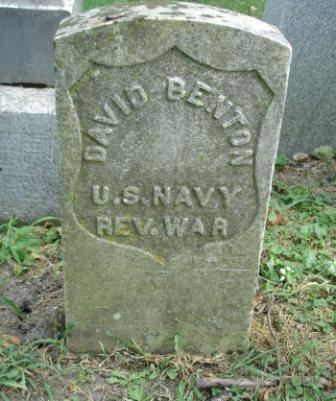David BENTON Jr
SAR Patriot #:
P-113655
The following information was assembled from numerous sources and cannot be used directly as proof of Qualifying Service or Lineage.
It is considered a research aid and is intended to assist in locating sources that can be used as proof.
State of Service: MA
Qualifying Service: Patriotic Service / Private
DAR #: A009470
Birth: 02 Dec 1763 Salisbury / Litchfield / CT
Death: 07 Mar 1845 Brownstown / Jackson / IN
Qualifying Service Description:
- Served from July to Nov.,1780, in Capt Warner's CO. of Colonel John Brown's Regiment from Berkshire Co, Mass
- He was present at an engagement with Tories and Indians under Sir John Johnson Oct. 19, near Ft. Plant, Montgomery Co, N. Y., in which Colonel Brown and about 40 soldiers were killed
- In July, 1781, he enlisted at New London, Conn., as a marine on the Brig "Favorite" of 16 guns
- Taken prisoner and confined on prison ship "Jersey" until exchanged in Jan., 1782
Additional References:
-
Pension: W 9351
Spouse: (1) Sarah Bingham; (2) Thankful Reynold McKane
Children: Walter; Norman; Sarah; Henry; Elizabeth; George;
Members Who Share This Ancestor
| Date Approved | Society | ACN | SAR Member Info | Lineage via Child | View Application Detail | |
|---|---|---|---|---|---|---|
| 1965-12-20 | MI | Unassigned | Theodore Edward Winkler Jr (92785) | Walter | ||
| 1966-02-28 | OH | Unassigned | Sidney Stemler Terhune (93878) | Walter | ||
| 1993-01-06 | IN | 213684 | Carl Greger Mitton (138466) | Elizabeth | ||
| 1999-03-18 | IN | 3431 | Richard Joe Benton (151626) | Henry | ||
| 1999-03-18 | IN | 3432 | Douglas Eugene Blankenship (151625) | Henry | ||
| 1999-03-18 | IN | 3433 | Raymond Leon Benton (151624) | Henry | ||
| 1999-03-22 | IN | 3434 | Ricky Dale Pray (151719) | Henry | ||
| 2011-07-14 | IN | 43165 | David Benton Greger (180159) | Walter | ||
| 2017-05-12 | NV | 74753 | Nicholas Paul Galbreath (202582) | William | ||
| 2021-10-22 | MD | 99417 | David Aiken Hart III (220779) | Walter | ||
| 2021-10-22 | MD | 99418 | Christopher Paxton Hart (220780) | Walter | ||
| 2021-10-22 | MD | 99419 | Travis Chase Hart (220781) | Walter | ||
| 2021-10-22 | MD | 99420 | Brian McKendree Hart (220782) | Walter |
Location:
Brownstown / Jackson / IN / USA
Find A Grave Cemetery #:
Marker Type:
Bronze Plaque and Bronze SAR Marker
SAR Grave Dedication Date:
Comments:
- Tombstone
- Photo and GPS courtesy of Ed Hitchcock, Daniel Guthrie Chapter, INSSAR
Directions to Cemetery / Gravesite:
located in Brownstone Township (NW quadrant of the NE quadrant of the SE quadrant of Section 11 Township 85N Range 4E) on the west side of N High Street at its northern end
